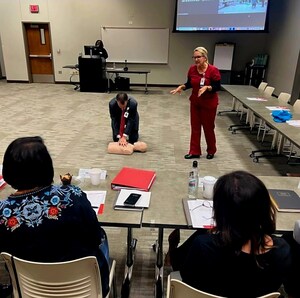American Heart Association Rapid Access Journal Report: Brain May Age Faster in People Whose Hearts Pump Less Blood
DALLAS, Aug. 2 /PRNewswire-USNewswire/ -- Keep your heart healthy and you may slow down the aging of your brain, according to a new study reported in Circulation: Journal of the American Heart Association.
(Logo: http://www.newscom.com/cgi-bin/prnh/20100222/AHSALOGO )
(Logo: http://photos.prnewswire.com/prnh/20100222/AHSALOGO )
In the study, people whose hearts pumped less blood had brains that appeared older than the brains of those whose hearts pumped more blood. Decreased cardiac index, the amount of blood that pumps from the heart in relation to a person's body size, was associated with decreased brain volume using magnetic resonance imaging (MRI).
Researchers observed the link even in those participants who did not have cardiovascular disease, such as heart failure or coronary heart disease. As the brain ages, it begins to atrophy (shrink) and has less volume. The decrease in brain volume is considered a sign of brain aging. More severe brain atrophy occurs in those with dementia, such as Alzheimer's disease.
"The results are interesting in that they suggest cardiac index and brain health are related," said Angela L. Jefferson, Ph.D., the study's lead author and associate professor of neurology at the Boston University School of Medicine. "The association cannot be attributed to cardiovascular disease because the relationship also was seen when we removed those participants with known cardiovascular disease from our analyses."
In the observational study, which cannot establish cause and effect, researchers examined brain and heart MRI information on 1,504 participants of the decades-long Framingham Offspring Cohort who did not have a history of stroke, transient ischemic attack or dementia. Participants were 34 to 84 years old and 54 percent were women.
Researchers measured cardiac index output using MRI and normalized the data for each participant's body surface area. Brain volume was accessed using MRI. Participants were divided into three groups based on cardiac index values.
The participants who had the lowest cardiac index, or the least amount of blood pumping from the heart for their body size, showed almost two years more brain aging than the people with the highest cardiac index. The participants in the middle cardiac index group, who had low but still normal levels of blood pumping from the heart, also showed almost two years more brain aging than the people with the highest (or healthiest) cardiac index.
"We expected an association between the lowest levels of cardiac index and smaller brain volumes, but we were surprised to find people on the lower end of normal cardiac index also have smaller brain volumes when compared to people with very health cardiac index," Jefferson said.
Because only 7 percent of all participants in the study had heart disease, Jefferson and her colleagues also didn't expect 30 percent of participants would have low cardiac index.
"These participants are not sick people. A very small number have heart disease. The observation that nearly a third of the entire sample has low cardiac index and that lower cardiac index is related to smaller brain volume is concerning and requires further study."
As a group, participants with smaller brain volumes did not show obvious clinical signs of diminished brain function. "We observed cardiac index is related to structural changes in the brain but not cognitive changes," Jefferson said. "The structural changes may be early evidence that something is wrong. Investigators from Framingham will continue to follow these individuals to see how structural brain changes affect memory and cognitive abilities over time."
The exact cause for a link between heart function and brain volume is still not well understood, Jefferson said. "There are several theories for why reduced cardiac index might affect brain health. For instance, a lower volume of blood pumping from the heart might reduce blood flow to the brain, providing less oxygen and fewer nutrients needed for brain cells. It is too early to dole out health advice based on this one finding but it does suggest that heart and brain health go hand in hand."
Co-authors are Jayandra J. Himali, M.S.; Alexa S. Beiser, Ph.D.; Rhoda Au, Ph.D.; Joseph M. Massaro, Ph.D.; Sudha Seshadri, M.D.; Philimon Gona, Ph.D.; Carol J. Salton, B.A.; Charles DeCarli, M.D.; Christopher J. O'Donnell, M.D., M.P.H.; Emelia J. Benjamin, M.D., Sc.M.; Philip A. Wolf, M.D.; and Warren J. Manning, M.D.
Author disclosures are on the manuscript.
The National Institute on Aging and the National Heart, Lung, and Blood Institute funded the research.
Statements and conclusions of study authors published in American Heart Association scientific journals are solely those of the study authors and do not necessarily reflect the association's policy or position. The association makes no representation or guarantee as to their accuracy or reliability. The association receives funding primarily from individuals; foundations and corporations (including pharmaceutical, device manufacturers and other companies) also make donations and fund specific association programs and events. The association has strict policies to prevent these relationships from influencing the science content. Revenues from pharmaceutical and device corporations are available at www.americanheart.org/corporatefunding. |
|
NR10 – 1104 (Circ/Jefferson)
Stats and facts:
- 81,100,000 people in the United States had one or more forms of heart disease in 2006.
- Heart disease, America's No. 1 killer claimed 831,272 lives in 2006.
- Each day an average heart beats 100,000 times and pumps about 2,000 gallons of blood.
- The average human brain weighs an average of 3 pounds in men and 2 pounds 12 ounces in women.
Additional media resources:
- Downloadable stock footage and animation, including a beating heart animation, are available at www.newsroom.heart.org, click on "Multimedia Resources."
- A Tour of the Brain is located on our site at http://americanheart.org/downloadable/stroke/1187703728154tourofbrain.pdf
SOURCE American Heart Association
WANT YOUR COMPANY'S NEWS FEATURED ON PRNEWSWIRE.COM?
Newsrooms &
Influencers
Digital Media
Outlets
Journalists
Opted In






Share this article